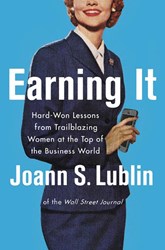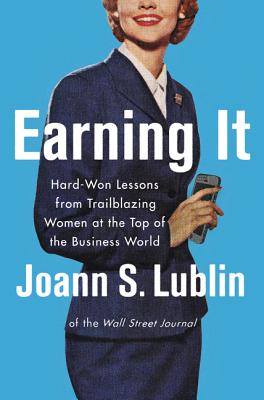Earning It: Hard-Won Lessons from Trailblazing Women at the Top of the Business World
October 20, 2016
Veteran journalist Joann S. Lublin has documented a generation of women leaders that have changed the face of business, and the challenges women still face on a daily basis in business.
 Earning It: Hard-Won Lessons from Trailblazing Women at the Top of the Business World by Joann S. Lublin, HarperBusiness, 304 pages, $27.99, Hardcover, ISBN 9780062407474
Earning It: Hard-Won Lessons from Trailblazing Women at the Top of the Business World by Joann S. Lublin, HarperBusiness, 304 pages, $27.99, Hardcover, ISBN 9780062407474
Joann Lublin began her career in journalism as a summer intern in the Washington D.C. Bureau of the Wall Street Journal. It was 1969, when women journalists were generally confined to the “women’s pages” of newspapers, “covering food, fashion, home furnishings, families, and parties.” Lublin refused to be pigeonholed and ended up with five front-page features during her three-month internship. It had been a wonderful introduction to a newspaper and field of work that would define her career, until the end of her last day:
On the day my internship ended, my boss walked me out the door of the office. He then leaned down and kissed me on the lips.
Stories like that are depressingly common, and get much worse, in Lublin’s new book, Earning It, which traces the career arcs of fifty-two women in corporate leadership roles—thirty-four who have led a public company. Lublin, in her interviews with these women, takes you inside their homes and offices, puts you in their shoes and inside their heads.
It is a seasoned journalist’s documentation of the first wave of women corporate leaders, who often opened “both their hearts and homes” to her, and share stories that are by turn disturbing, uplifting, unnerving, and energizing. Even when the stories are not about outright assault, they are often demeaning, such as when a high-powered investment banker that flew often for her job in the 1970s was mistaken for a flight attendant by a fellow passenger who handed her his coat, expecting it to be hung up. Penny Herscher, of the business analytics firm FirstRain, tells us she is still frequently mistaken as the secretary. Preparing to take her former company Simplex public, she entered a meeting room filled with a group of investment bankers hoping to chosen as advisors, one of whom promptly asked her to clean up a spilled Diet Coke he had just knocked over. She grabbed a paper towel and did so, washed her hands, and then extended one toward the banker as she introduced herself as the CEO.
There are also a lot of stories, and advice, about working with terrible bosses—and surviving them. Geraldine Layborne, an early staffer at Nickelodeon who ended up running that network, described her bad boss as “the very best teacher I ever had because I kept a notebook of ‘what I will never do when I am a boss.’” You’ll hear how these women formed alliances and overcame subtle sexism and overt sexual harassment in the workplace. And it is the many instances of harrasment that are most horrifying, ranging from a boss whispering “this could have been mine” to an employee when finding out she was pregnant to Mary Barra, now head of GM, getting catcalled while walking the floors of the factories as a young engineer—a situation she diffused with a direct, though surprisingly friendly, confrontation. Of course, it’s not a new phenomenon:
Sexual harassment has long represented an occupational hazard for women. As I wrote in a front-page article in the Wall Street Journal in 1981, unwelcome physical or verbal advances usually directed by men at women pervade the workplace and increase employee absenteeism and turnover.
Little has changed since then. One in four women has experienced sexual harassment in the workplace, Langer research Associates found in a 2011 poll of 1,018 American adults.
It gets worse if you work in Silicon Valley where “60 percent of those polled said they had experienced unwanted sexual advances.” That may help explain some of the decline in females working in that sector.
And even in light of all those statistics, I still bristled at some of the advice offered, such as:
Avoid office parties with heavy drinking, late business dinners, or other potentially risky venues.
It seems to me that it is men’s responsibility not to sexually assault women, not women’s responsibility to avoid certain situations, but I am perhaps being overly idealistic and unrealistic—especially in the face of the daunting statistics and overwhelming evidence that is presented in this book. Hopefully that changes, and changes fast.
There is one aspect of the book, on how to navigate life as a working parent (or how to be a “managing mom”) that is almost non-existent in books that aren’t written specifically to an audience of women, which is too bad because there are many working fathers out there pretty desperate for the advice. But perhaps it’s appropriate that we must turn to a book written explicitly for women for advice, because for women searching for the executive advice that is traditionally delivered in a male voice to male readers, women have always had to look to books that are at least implicitly for men.
There are profound personal struggles, like the story of how Dawn Lepore simultaneously led her company while spending the wee hours of each night with her husband battling myeloma in the hospital (she also had a daughter in kindergarten and a son in third grade at the time, and a housekeeper she discovered was stealing money from her). You’ll read about how Carol Bartz successfully led her company while battling breast cancer, and how one reporter asked her at the press conference “which breast”—a question I don’t believe they’d ask a male executive with testicular cancer.
But it is not all bad news. Women have made great strides since the 1970s, when Lublin entered the workforce, and she has seen much of it firsthand—and experienced it herself. And you’ll get a lot of advice and learn many valuable lessons. Sometimes, the advice contradicts other voices in the book. You’ll hear from a woman who refused to fetch coffee for her male colleagues, and one who was all too willing to get her start in television with her “ardent willingness to perform menial tasks” like getting coffee and photocopying scripts, and ended up launching the History Channel and rising to chief executive of A&E. There is strength in that multitude of voices, because readers’ circumstances will vary, and it may be necessary to consider different starting points and strategies to get your first break.
And, as I mentioned earlier, this is a really wide-ranging, first-hand exploration of a generation of women who pulled down barriers, shattered glass ceilings, and paved the way for those to follow. There are stories and tips about how to negotiate better pay from the “First Lady of American Magazines,” Cathie Black, and how to navigate sexual harassment from the “queen of Madison Avenue,” Charlotte Beers. You’ll learn how being fired (and not being elected when pursuing politics) can be a boon to one’s resilience from Meg Whitman.
Lublin also explores the “glass cliff” phenomenon, the fact that women are more likely to be offered the reins of struggling companies, and how to navigate it. She explores the importance of mentors—both male and female—and how to manage men well. You’ll learn that there is really no such thing as work-life balance, and how to let go of that myth. (More than 80 percent of the people she interviewed have children.) There is a story of a woman doing media interviews six hours after her daughter was born, and of one executive who cut her maternity leave short when she was asked to organize a new division at her company, but brought her son to work so she could continue breastfeeding him, doing so even while sitting at a conference room table with all male colleagues (with a nursing shirt for discretion).
As a man, reading Lublin’s fascinating book opened my eyes, in a more personal and direct way, to the challenges women face in the workplace. I knew them in the abstract, but the stories these women share make it more visceral and real, even made it hurt. Yet I still can’t imagine how real and hurtful it must be for women on a daily basis. It also provided great advice for how to exist as part of a two-career couple, a section of the book which I marked up copiously. Beyond that, it gave me great advice on how to advocate for better pay—for myself and others—which I have always been very uncomfortable doing. And it offers many lessons for how to advance in a corporate environment should I ever choose to go that route. Even though the advice is tailored to women, I think it fits men quite well, especially as men take on more responsibility at home.
But, of course, it is for women first and foremost, and I think the key takeaway comes from an interview with Linda Hudson:
It’s wrong for women “to assume the playing field is level today,” said Linda Hudson, a former CEO of BAE Systems Inc., a big defense contractor … She was the first woman to head a major Pentagon supplier. “These gains are relatively recent,” she warned. “They could be just as fleeting.”
It's important to hold on to the gains made. Lublin again uses the high-tech industry, which, while it has a few high-profile women leaders, has been derided for “frat boy” culture and seen a steady decline in women participation since the 1990s. And that is their detriment, because the evidence is overwhelmingly in favor of women leaders and gender diversity:
The eighty women who steered Fortune 1000 concerns between 2002 and 2014 delivered shareholder returns, a measure of stock price changes and reinvested dividends, that were three times better that the Standard & Poor’s 500 Index …
Lublin wraps up discussing unconscious bias and attempts to address it in corporate America, how women’s issues have become men’s issue, too, and what role powerful men can play in hastening the transition to a more equitable workplace and promote gender diversity. It is the best book that I’ve read on these topics since Anne Marie Slaughter’s Unfinished Business. And it has the added benefit of documenting the personal stories of a group of women that have worked incredibly hard and endured a lot of hardships, and changed the history of business in this country.


